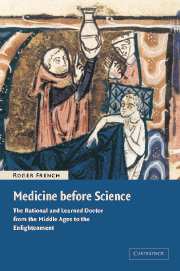1 - Hippocrates and the philosophers
Published online by Cambridge University Press: 10 December 2009
Summary
MEDICAL WISDOM
When the medieval doctor looked into the past for the beginnings of his own profession, what he found was the figure of Hippocrates, the Father of Medicine in the medical tradition from the Middle Ages to the Enlightenment. Modern scholarship has not revealed much about the historical Hippocrates or which of the ‘Hippocratic’ works were written by him, but the medieval doctor felt more secure in his knowledge. The Hippocratic works gave him a number of things. There was technical advice in a practical subject, which told him what to do and what to expect. For instance, the corpus includes works that explain how to reduce dislocations and how to bandage wounds. The Hippocratic works were also valuable because they were Hippocratic, that is, ancient and authoritative in an age that revered antiquity. These first two chapters are not directly concerned with the first of these aspects of antiquity, the technical content of Greek medicine and philosophy. They are not, that is, a background to or an early history of a professional activity developed during the Middle Ages and beyond. Rather, they present an image of the medieval and later perception of antiquity, a construction (however false in our historical terms) within the Latin tradition and on which the later Western doctors based their actions. It is not a story of beginnings but of resources.
- Type
- Chapter
- Information
- Medicine before ScienceThe Business of Medicine from the Middle Ages to the Enlightenment, pp. 9 - 33Publisher: Cambridge University PressPrint publication year: 2003



